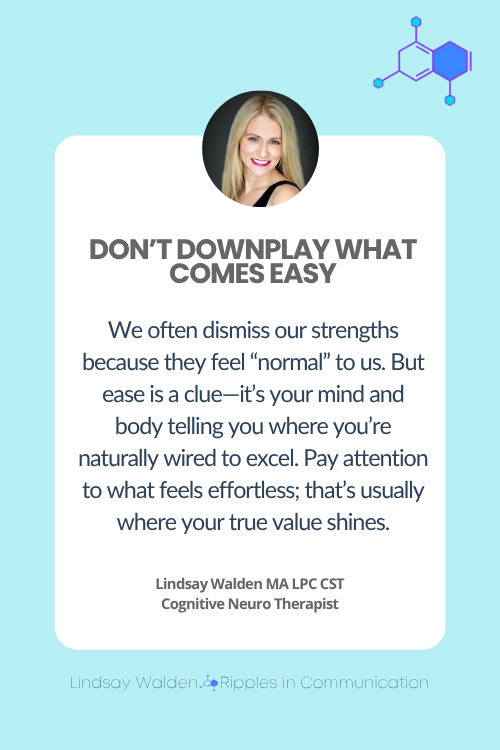How to Discover and Use Your Strengths (Even the Ones You Overlook)
Have you ever felt like you’re not living up to your potential—but you can’t quite put your finger on why?
Maybe you’re good at a lot of things, but you’re not sure which really matter. Or maybe you downplay your skills because they seem “normal” to you—even though other people would call them gifts.
It’s so easy to miss our own strengths.
In therapy, I see this all the time.
People are quick to list their flaws, insecurities, and fears in great detail. But ask them: “What are you good at?” and they freeze.
Not because they don’t have strengths. But because they’re not used to seeing them.
That’s why this work matters so much.
Your strengths and skills are the foundation of your success, your confidence, and your ability to grow.
When you can see them clearly, you can:
Navigate challenges with less fear.
Build goals that feel meaningful and achievable.
Show up in the world with authenticity and self-trust.
This post is about helping you do exactly that.
You’ll learn:
Why recognizing your strengths matters so much (with the brain science behind it).
How to uncover strengths you might be overlooking.
Practical prompts to help you name and own your skills.
Ways to use those strengths to grow, achieve, and thrive.
DON’T FORGET YOUR FREE GUIDE!
Have you grabbed your FREE CNT Toolkit Sampler yet? It’s packed with science-backed tools designed to help you regulate emotions, manage stress, and develop deep self-awareness. If you’ve ever felt overwhelmed by your reactions or stuck in negative thought patterns, this toolkit will give you the proven strategies I use with clients to help them strengthen emotional neutrality, rewire unhelpful responses, and build lasting resilience. Inside, you’ll find practical exercises and guided reflections to help you navigate challenges with clarity and confidence. Enter your email below, and I’ll send it straight to your inbox!
Why Knowing Your Strengths Matters
Here’s the thing: your strengths are there.
But if you never slow down to see them, you’ll keep operating at half-capacity, second-guessing yourself, or settling for less.
When you know your strengths, you can:
Boost Your Confidence Recognizing what you’re naturally good at builds self-trust. It’s not arrogance—it’s accuracy.
Navigate Challenges When life throws obstacles at you (and it will), knowing your strengths gives you a roadmap. You know what tools you can lean on.
Achieve Goals The goals that matter most aren’t always the “shoulds.” They’re the ones that align with what you’re actually good at and energized by.
The Neuroscience Behind Strengths-Based Work
This isn’t just feel-good self-help.
There’s strong research showing that strengths-based approaches:
Improve performance and productivity
Increase engagement and motivation
Reduce burnout and stress
Enhance overall well-being
Why?
Because your brain literally works better when you operate in areas of strength.
When you use your strengths, you activate the reward centers in the brain, releasing dopamine and reinforcing positive behavior.
You also reduce cognitive load. Tasks feel less like work and more like flow.
Bottom line: leveraging your strengths isn’t just easier. It’s smarter.
How to Uncover Your Hidden Strengths and Skills
Most people underestimate their own strengths because they’re used to them.
What feels “easy” or “normal” to you might be remarkable to someone else.
Below are practical prompts you can use to start identifying your own strengths.
You can work through these in a journal, in conversation with a trusted friend or partner, or even just by reflecting quietly.
1. Identify Your Key Strengths
Think about this simple but powerful question:
Prompt:
What is one skill or strength people often compliment you on?
This can be anything:
Problem-solving
Empathy
Organization
Creativity
Leadership
Active listening
Humor
Often, the things that feel most natural to you are exactly where your strengths lie.
2. Reflect on Your Accomplishments
Strengths aren’t abstract. They show up in real life.
Prompt:
Describe a moment when you achieved something you’re proud of. What strength did you use to make that possible?
Look for the “how” behind your success.
Did you plan carefully? Adapt quickly? Connect with people? Stay calm under pressure?
These details reveal your real, usable strengths.
3. Explore Untapped Potential
Many of us have strengths we haven’t even fully explored.
Prompt:
What’s a hidden talent or skill you haven’t fully developed yet? How can you begin?
Maybe you have an eye for design but never had time to pursue it. Or you’re a natural mediator who could lead better conversations at work. Or you’ve always wanted to write, lead, teach, strategize, or build.
Your strengths are seeds. They grow when you give them space.
Real-Life Example: Anna’s Story
Let’s make this practical.
Anna was a designer who felt completely stagnant in her career. She couldn’t figure out why.
In our work together, we explored her strengths.
She realized she wasn’t just good at design. She was great at storytelling and understanding how brands connect emotionally with people.
That strength wasn’t fully being used in her current role.
So she got intentional. She took courses in branding strategy and pitched new ideas at work.
Within a year, she transitioned into a new role focused on brand strategy—something that reignited her creativity and made her feel alive at work again.
Insight: Your strengths aren’t just what you can do. They’re what you should be doing more of to feel fulfilled.
Tips for Leveraging Your Strengths
It’s one thing to identify your strengths. It’s another to actually use them.
Here are a few ways to turn awareness into action.
Match Strengths to Goals Look at your personal or professional goals. Which of your strengths support those goals? How can you double down on them?
Seek Opportunities to Grow Don’t just use your strongest skills—develop them. Challenges aren’t roadblocks; they’re opportunities to refine what you’re good at.
Reflect on Your Progress Journaling Prompt:
How have I used my strengths to overcome challenges or achieve success recently? Regular reflection helps you see patterns and build confidence in your ability to handle what comes next.
Benefits of Knowing and Using Your Strengths
Why go through this process?
Because the payoff is real and lasting:
Enhanced Confidence When you acknowledge your skills, you see yourself more accurately and positively.
Greater Productivity Working from your strengths is more efficient and effective. It feels less like struggle and more like flow.
Improved Resilience When challenges come up (as they always do), you’re better equipped to navigate them using what you already know works.
Conclusion: Unlock the Power of Your Strengths
You have strengths. Skills. Abilities. Some you know well. Others you haven’t even discovered yet.
They’re not luxuries. They’re the tools you need to build the life you want.
Understanding and leveraging your strengths is key to unlocking your potential.
The Strengths & Skills section of the CNT Self-Discovery Puzzle is designed to help you do exactly that—with structured, practical prompts that guide you to see what’s best in yourself, clearly and confidently.
You can download the CNT Toolkit Sampler today to start reflecting on your strengths and building your future with intention.
Download the CNT Toolkit Sampler now and start your journey of self-discovery.







